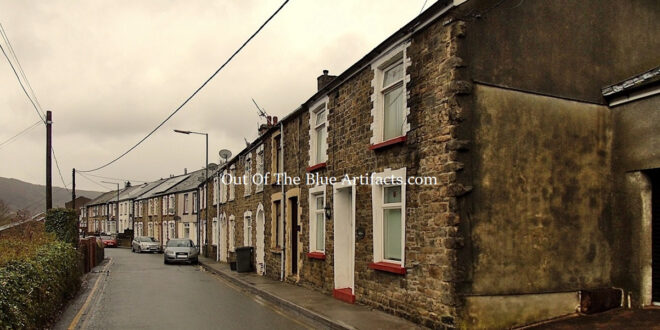The Ivorites Inn – Castle Street Abertillery.
The early history of the Ivorites Inn, Castle Street, Abertillery (as seen in the main featured image) is a little unclear. I am not sure when the Ivorites Inn, Abertillery was established though it was mentioned in a report from 1869, the landlord at that time was Mr John Griffiths, it stated in the report that it was the Ivorites Arms. It was reported as being the Ivorites Arms and also the Ivorites Inn, Abertillery, in various reports.
The 1871 Census.
The 1871 census shows the area of what would later become Castle Street began at Castle Row heading southwards to Matthews Houses, Matthews Row, Golden Lion Cottage, the Golden Lion Inn and a grocers shop. Next along the line was James’ Row and a batch of houses called the Western Valley’s Terrace until the Primitive Methodist Chapel House (the premises at a right angle to the road) on what is now known as Lower Castle Street, occupied by Mr Charles Saunders, his wife Hannah and family. Mr Charles Saunders was the leading figure in the Methodist Movement at Abertillery in the mid 19th century.
The next address on the same listing is the Ivorites Arms occupied by John and Mary Griffiths (apart from being the licensee) Mr Griffiths was listed as being a sawyer by trade. The Ivorites Cottage was occupied by John and Rosa Morris, Mr Morris was listed as being a wheelwright with his son Edmund listed as a millwright. The next two addresses were known as Edmunds Row and Phillips Row with a cottage on each, with no other premises, that was the end of the census.
The 1871 Post Office Directory of Monmouthshire.
The 1871 Post Office Directory of Monmouthshire lists Mr John Griffiths as landlord of the Ivorites, Abertillery and also a separate listing as a beer retailer.
An 1881 Map Overlay.
On an overlay of the 1881 map there is a building on Castle Street in the exact spot where the houses numbered 49 and 50 now sits, there were no other properties close by at this time except for the old Methodist Chapel building opposite on (what is now known as Lower Castle Street) and a few terraced cottages between the Golden Lion Hotel and the Ivorites Inn. Later, as more blocks of terraced houses were constructed along Castle Street, southward towards Six Bells, they were abutted and were joined into the Ivorites Inn. Evidence of this can be seen in the stonework in the terrace, the stone in the frontage of numbers 49 and 50 is much older and old small stone or brick arches can be seen under the new brickwork or mouldings around the doorway and window, showing the building is a lot older and that it had been renovated earlier in time, brought in-line with the newer cottages adjoining.
Mrs Mary Griffiths.
On the 1881 census Mrs Mary Griffiths was the landlady. Born in 1815, Mrs Griffiths was from Kington in Hereford. The Ivorites Inn was owned by the Webb Brothers, Brewers of Aberbeeg. Mrs Griffiths was the wife of Mr John Griffiths the first landlord mentioned in reports as far back as 1869.
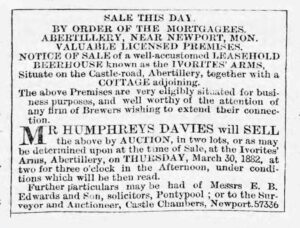 The Sale of the Ivorites Arms 1882.
The Sale of the Ivorites Arms 1882.
In March 1882 the Ivorites Inn was sold at auction (as seen left) it was described as being a beerhouse, having a cottage attached and was situated on Castle Road, Abertillery. This cottage was known as the Ivorites Cottage.
There was no other mention of the sale of the Ivorites Inn, although Webb’s Brewery of Aberbeeg, owned it up until its official closure in 1902.
Mr Edward Plummer.
In March 1889 Mr Edward Plummer and his wife Hannah were the licensees and they had a cellar built at the premises in the December of that year but as yet to be verified as no further evidence of this can be found.
Mr David Morgan.
From 1892 the Bedwellty Publicans Licences file 1874-1938, shows Mr David Morgan, a contractor, as being the landlord of the Ivorites Inn, Abertillery.
The Death of Mr David Morgan.
In November 1896 Mr David Morgan passed away after a long illness.
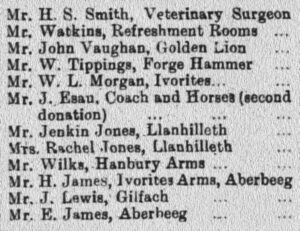 Mr W. L. Morgan.
Mr W. L. Morgan.
In May 1898 the South Wales Gazette published a list of subscribers (as seen right) donating to the Abertillery Relief Fund, the list showed that Mr W. L. Morgan was the landlord of the Ivorites Inn, Castle Street, Abertillery. The Bedwellty Publicans Licences file shows the dates 1896 to 1899 with tenant and owners names struck-through, I believe the Ivorites Inn stopped trading sometime in 1899.
The Closure Proposal.
The Webb Brothers of Aberbeeg, who were the owners of many pubs and inns in the area also owned the nearby Forge Hammer Inn on King Street and the Golden Lion on Castle Street, Abertillery.
The Cwm Hotel Abertillery.
In the late 1890’s, Webb’s Brewers of Aberbeeg wanted to have a new hotel built on the northern end of the proposed new road, which was to be called Alexandra Road, connecting Abertillery with Six Bells on the eastern side of the valley. This new hotel was named the Cwm Hotel, after the Cwm Estate who owned the land that it was to be constructed upon.
The Licensing Authorities.
The licensing authorities would only grant the licence for the proposed new hotel on condition that Webb’s Brewers of Aberbeeg would transfer the Forge Hammer Inn licence to the new hotel, then close the said inn and also close the Ivorites Inn. This condition was to prevent Webb’s Brewery of Aberbeeg having a monopoly on the trade in such a small area.
The brewers decided to comply with the condition placed upon the granting of a licence and transferred the Forge Hammer Inn licence to the new Cwm Hotel and as ordered, they planned to close the Ivorites Inn. In 1900 the new Cwm Hotel was under construction.
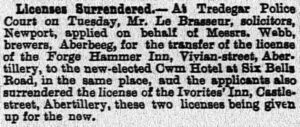 The Licence Transfer.
The Licence Transfer.
In December 1902, the licence for the Ivorites Inn, Castle Street, Abertillery, was surrendered and the licence for the Forge Hammer on King Street was transferred to the Cwm Hotel, Alexandra Road, Abertillery.
The Sale of the Both Inn’s Fitments.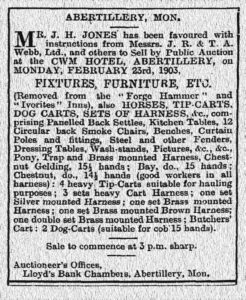
On Monday 23rd of February 1903, the premises, fittings and furniture of both the Ivorites Inn and the Forge Hammer Inn was auctioned off (as seen right) at the newly constructed Cwm Hotel, Abertillery.
Some of the effects to be auctioned from both inns were three horses, horse, dog and tip carts, harnesses, settles, kitchen tables, benches, chairs, dressing tables and washstands etc.
Mr Daniel Seys Davies (D. S. Davies) Abersychan.
The Webb’s Brewers of Aberbeeg files shows that on Wednesday the 8th of April 1903, an agreement between Messrs J. R. & T. A. Webb, Aberbeeg Brewers and Mr Daniel Seys Davies (D. S. Davies) of Abersychan, mineral water manufacturer was drawn up for the latter to lease the premises formerly known as The Ivorites Inn, together with a cottage adjoining known as Ivorites Cottage situate in Castle Street, Abertillery at £25 per annum.
In 1906 Mr Daniel Seys Davies, (D. S. Davies) of Abersychan, Mineral Water Manufacturer, was ordered by the Abertillery Council to stop obstructing the traffic in Castle Street, Abertillery by allowing the feeding of his horses on the highway.
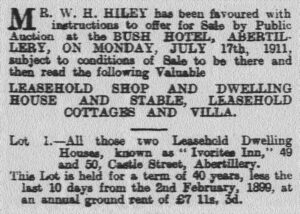 The Sale of the Ivorites Inn.
The Sale of the Ivorites Inn.
On Monday 17th of July 1911, the two houses No.49 and No.50 which was previously known as the Ivorites Inn and cottage were put up for auction (as seen on the actual auction notice below) at the Bush Hotel, Abertillery.
The following information is taken from Wikipedia.
The Philanthropic Order of True Ivorites.
The Philanthropic Order of True Ivorites, commonly referred to as the Ivorites Society or the Ivorites (Welsh: Yr Iforiaid), was a friendly society founded in Wrexham, Wales, in 1836.
History.
The Order of True Ivorites was founded by Thomas Robert Jones (1802-1856) and was named after Ifor Hael, one of Dafydd ap Gwilym’s patrons. The society’s motto was ‘Cyfeillgarwch, Cariad a Gwirionedd’ (English: Friendship, Love and Truth), and it was the only friendly society which conducted its business exclusively in Welsh. As well as helping the poor and needy, the order furthered the Welsh language through organising local Eisteddfodau. In The Laws and Regulations of the Order, published in 1839, states that the True Ivorites Society is an institution ‘to encourage the Welsh language, to preserve its members as far as possible from want’. The laws also stated that ‘all books and accounts belonging to this Society be kept in the Welsh Language’. These laws were then amended in 1858, when the ruling regarding the usage of Welsh stating that the secretaries of the lodges should be competent in record keeping in both English and Welsh. This reflects the competition from other societies and the change in the number of Welsh speakers in Glamorgan during the later nineteenth century.
The Ivorites, along with fellow friendly society the Oddfellows, were especially strong in Glamorgan, and survived well into the twentieth century. The societies were often a substitute for trade unions, but were never a threat to the unions’ existence; unions tended to grow out of the activities of the friendly societies.
Although not a secret society the Ivorites had their own handsigns and handshakes which were published in a booklet.
 Out Of The Blue Artifacts A Library of a lifetime of collecting
Out Of The Blue Artifacts A Library of a lifetime of collecting
